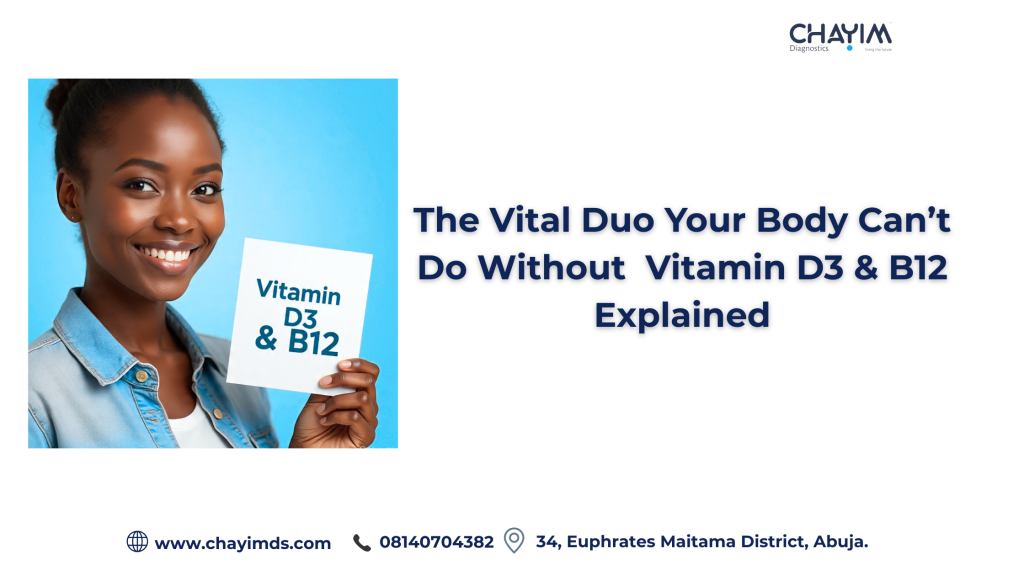The Vital Duo Your Body Can’t Do Without – Vitamin D3 & B12 Explained

Vitamins are essential nutrients your body needs in small amounts to function properly. They play a role in everything from energy production to immunity, brain health, and cell repair. Unlike carbohydrates, proteins, or fats, vitamins don’t provide energy directly but without them, your body’s systems can’t work efficiently.
Vitamins are generally divided into two main types:
- Fat-soluble vitamins – stored in your body’s fat and liver (e.g., A, D, E, K).
- Water-soluble vitamins – dissolve in water and aren’t stored in large amounts (e.g., B-complex vitamins, Vitamin C).
Because the body can’t always produce enough vitamins on its own, we rely on food, supplements, and sometimes sunlight to get what we need.
For this blog, we are focusing on Vitamin D3 and Vitamin B12 two nutrients that are often overlooked but vital for energy, mood, and overall health. Many people are unknowingly deficient in one or both, and these deficiencies can quietly affect your wellbeing.
Vitamin D3 (The Sunshine Vitamin)
Vitamin D3 helps your body absorb calcium, keeps your bones strong, supports your immune system, plays a role in mental well-being and also fertility.
Here’s the interesting part: your body can make Vitamin D3 when your skin is exposed to sunlight. But thanks to indoor jobs, sunscreen (not applied at the right time), pollution, and clothing, most people aren’t getting enough sun exposure to meet their needs. A Vitamin D3 deficiency often develops quietly before leading to more serious problems like osteoporosis or autoimmune conditions.
What Happens When You are Low on D3?
You might feel:
- Bone pain or weak muscles
- Frequent colds or infections
- Low mood or even depression
- Fatigue or general weakness
Brain fog or poor concentration
How Can You Boost Your Vitamin D3 Naturally?
- Spend 10–30 minutes in safe morning or evening sun (6–8 a.m. or 5–6 p.m.)
- Eat Vitamin D-rich foods like salmon, tuna, sardines, egg yolks, liver, yoghurt, spinach, and broccoli
- Take supplements only if recommended by your doctor and always test before guessing your levels
What is Vitamin B12 (The Energy Vitamin)
Vitamin B12 is the body’s natural battery charger, it keeps your nerves, red blood cells, and brain in top shape and also turns food into energy. Found naturally in animal foods (meat, fish, eggs, dairy), it’s a vitamin that vegetarians, vegans, and people on low-animal diets need to monitor closely.
Low B12 may cause;
- Fatigue or weakness
- Tingling in hands and feet
- Memory lapses or poor concentration
- Mood swings or anxiety
- Pale skin
- Vision problems and also fertility issues
Long-term B12 deficiency can lead to nerve damage or even anemia which is why catching it early matters.
How to Boost your B12 naturally:
- Eat beef, liver, chicken, fish, eggs, or milk
- If vegetarian/vegan, choose fortified foods or supplements as prescribed by your doctor
- Take a blood tests to track your level. B12 is water-soluble so your body doesn’t store it for long. You need a regular intake to stay topped up
Why They Work Better Together
Think of your body as a high-performance engine:
- Vitamin D3 supports your bones, mood, and immunity
- Vitamin B12 keeps your nerves, brain, and energy system working right
When both are optimal, your body runs smoother, your mind feels sharper, and your energy lasts longer and that’s the heart of holistic wellness.
Wellness begins with awareness, have you checked your Vitamin D3 and B12 levels this year? Even if you feel fine, deficiencies can develop quietly.
Don’t assume, Get Tested
Watch out for our next blog, we will be focusing on Vitamins and Fertility.



Responses